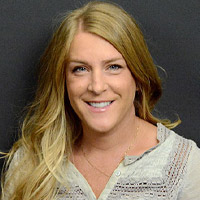Seventy BS in Nursing students at Anschutz Medical Campus had a unique opportunity to get hands-on experience during their clinicals at an assisted living community for their Nursing Care of the Older Adult course.
CU Nursing Associate Professor of Clinical Teaching and Specialty Director of the Adult-Gerontology Primary Care Nurse Practitioner Program, Kelly Henrichs, DNP, RN, GNP-BC, wanted to find out how working so closely with older adults changed students’ perspectives.
“I’ve been in those communities so often, and that’s why I was so passionate about getting students there because I feel like a lot of students haven’t been exposed to that environment,” Henrichs says. “I think there’s a lot of stereotypes around those settings, and I wanted students to see how vibrant the community is and how engaged the residents are, and how wonderful they are.”
CU Nursing previously profiled Henrichs’ work to bridge the gap in geriatric care. That work was part of her study called “Using Assisted Living Communities to Enhance Nursing Student Attitudes Toward Older Adults”. It was published in the Journal of Gerontological Nursing in February.
Nearly half of the students (33 of 70) completed surveys after their clinicals at assisted living communities. Nearly 80% of them said the experience was valuable to them and should be continued for other students.
“These results confirmed what I already know in my heart – that older adults are a special population and they have so much to offer younger people,” she says.
Nursing Care of the Older Adult Course Survey Questions |
||||||||
|
Question |
Strongly agree |
Agree |
Neutral |
Disagree |
Strongly disagree |
Yes |
No |
Neutral |
|
I enjoyed the clinical experience |
15 |
13 |
5 |
0 |
0 |
|||
|
The experience was valuable to me & should be continued |
26 |
0 |
0 |
|||||
Open-Ended Questions for Students |
|
Henrichs says clinicals in assisted living communities benefit both students and residents. She paired a student with a resident to interview. Part of the interview was about their medical history, but the other part was about hearing about their lives.
“Not only do our students get to see healthy aging and a vibrant community, but we get to dispel a lot of these myths and stereotypes that we have around the older population,” she says. “It’s great for the residents too, because they love talking to people. They love hearing about the students’ lives.”
Henrichs’ study found that after this experience, students said they could see themselves working with older adults, whereas before they weren’t considering taking that career path. The study suggests offering this clinical experience could change other undergraduate students’ mindsets to work with this population. The study also acknowledges the demand for nurses with knowledge of caring for adults is important as the population of people over 65 continues to grow.
“Most nursing jobs are with older adults unless you go into labor and delivery,” Henrichs says. “I have students who say they want to work in the ICU, and who is in the ICU? Older adults. Who’s in the ER? Older adults. That’s the demographic, and that’s where the population is going.”
What Comes Next?
Since the Spring 2023 semester, the clinical experience has expanded to include time in a long-term care community, and there are plans to put students in more assisted living communities for the Summer 2024 semester.
“There’s something really powerful about getting that face-to-face interaction,” Henrichs says. “Research shows that the more interaction nursing students have with older adults, the more positive their views become of older adults, as well as higher knowledge of working with them. Then, they are more likely to work with that population after graduation.”
Henrichs is currently collaborating on another study with older adults and CU Nursing students. The research will look at CU Nursing students’ knowledge, attitudes, and intentions to work with (after graduation) older adults. She’s surveyed students at different points to see how those different factors change and will start looking at the data in June.
“I’m excited that CU Nursing is taking the opportunity to highlight this and show students that we’re serious about DEI concepts like ageism,” Henrichs says. “Age discrimination is a real thing, and these things we’re doing is moving the needle and shifting perspectives, which is exactly what we want to do.”



